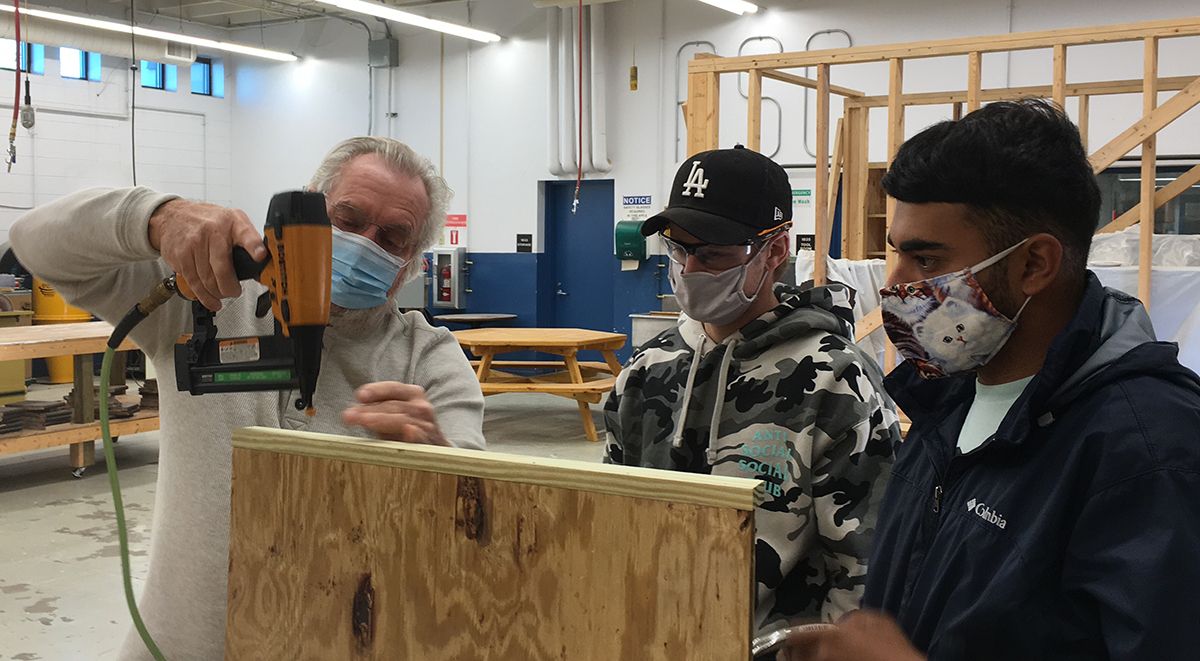Troy Moon, Pensacola State College
Daniel Cortes started out taking a few business courses at Pensacola State College as he tried to hammer down a career path. But for Cortes, it wasn’t a good fit.
“I wasn’t feeling it,” he said. “It just wasn’t working out for me and I wanted something different. I wanted something that would help me in the world. And I’d like to build my own house someday.”
Now, Cortes is in the business of carpentry. He’s in his second of three semesters in the nationally-accredited PSC Carpentry program. And, forgive another building pun, he began his carpentry work from the ground floor up.
“I didn’t really have a lot of experience working with a lot of tools,” Cortes said. “But Mr. Grahame is a great teacher and he really teaches you everything you need to know, and the right way to do things.”
“Mr. Grahame” is PSC Carpentry program coordinator Tony Grahame, a Certified Master Builder who has led the College’s program since 2014. Before coming to PSC, Grahame led carpentry programs at colleges in Arizona and Georgia. He has received numerous awards throughout his career, including several from the National Association of Home Builders.
“We provide the training, the safety protocols, we teach them how to use tools properly and effectively and how to maintain them too,” Grahame said. “But there’s so much more.”
He stood in a carpentry classroom, where a triangle and some geometric equations were written on the whiteboard behind him. Yes, there’s so much more.
“It’s more than just working with wood,” Grahame said. “Real carpenters are making design decisions, laying out foundations, doing calculations. And they’re learning to build and design the next generation of houses.”
The next generation of homes, he said, will be smaller in many cases, and designed and built to be energy efficient, environmentally friendly and sustainable, and low maintenance.
PSC Carpentry students get first-hand experience in building those homes. The carpentry students, along with students from other PSC Workforce programs such as HVAC and Electrical, are nearing completion of a 600-square-foot energy-efficient mini-house for the Escambia County Housing Finance Authority, which is financing the project. When completed –- deadline is summer -– the home will be sold to a qualified, first-time homeowner at an affordable price. Construction began late in 2018, but construction was delayed for months because of COVID-19. Grahame said the carpentry students will begin work on a new home in the downtown Pensacola area next fall.
The current mini-home is hurricane- and storm-resistant and features a 300-square-foot wrap-around covered porch and solar panels to reduce electrical costs.
“PSC has one of the few programs around the country that teaches students how to build these types of homes,” Grahame said. “This program is one of the most progressive and innovative programs in the country. I’ve seen a lot of programs because I’ve been doing this for a long time. This is one of the best.”
The PSC program offers students an opportunity to earn a Vocational Certificate in Carpentry. It’s a three-term 1,200 clock-hour program and it leads to a certification from the National Center for Construction Education and Research (NCCER).
In the first term, students take three courses: Introduction to Craft Skills, Introduction to Carpentry and Building Layout and Foundations. In the second term, students take Carpentry Rough Framing and Carpentry Exterior Finishes. The final term consists of one 300-credit hour course: Interior Finish and Trim.
Students also gain advanced carpentry certificates including the NCCER Craft Trade Certificate in Carpentry, OSHA10 Safety Credentials and the CPR/AED/FA Certificate.
Typically, students begin their first semester in fall, and finish the third semester the following summer.
Tyler Henderson is a first-semester carpentry student, and U.S. Air Force disabled veteran.
“I don’t work, so this is just a good trade for me,” Henderson said. “I can learn something constructive and better my life.”
Many students, Grahame said, take carpentry in addition to other workforce programs to gain more experience and insight into the homebuilding world.
“Some want to work toward their contractors’ licenses,” he said. “Some want to work for themselves. Carpentry is high demand right now. I get calls on a weekly basis from people looking for cabinet makers, carpenters and workers for other jobs. Here, we teach you things you’re not going to be taught on the job site. But they’re aspects of the profession that will allow graduates to go on be successful.”
For information on the Pensacola State College Carpentry program, go to http://www.pensacolastate.edu/academic-programs/carp-vc/ or call (850) 475-4875.
PHOTO: Carpentry program coordinator Tony Grahame instructs students Tyler Henderson and Daniel Cortes on the proper angle to use a nail gun. Photo by Troy Moon

 PirateQ
PirateQ 
